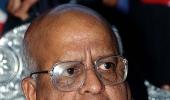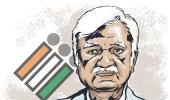When TN Seshan's name was proposed for the post of chief election commissioner by the Chandra Shekhar government, he was caught in two minds.

So, he approached Rajiv Gandhi and the then president Venkataraman and was advised by both to accept it only if no other job was available.
Still confused, he decided to consult one last person -- the Kanchi seer.
He gave his go-ahead, saying, "It is a respectable job."
Having got his answer, Seshan rang up the law minister saying he was ready to take charge.
This episode features in Seshan's autobiography Through the Broken Glass, published posthumously by Rupa. Seshan passed away in 2019.
"… The then CEC, Peri Shastri, passed away owing to ill health. The government did something that was very unwise. It went ahead to process the appointment of Rama Devi, secretary, law, as the acting CEC. On the fourth day after Devi took over, I got a phone call from the cabinet secretary, Vinod Pande," the book says.
Pande said the government was planning to appoint Seshan, who was then a member of the Planning Commission, as the CEC.
"I was surprised to know that someone would think of me as the CEC. So, my immediate reaction was to say 'no' because when did I ever have anything to do with elections?" the book says.
Law minister Subramanian Swamy told him, "I want an answer from you, so that I can process the papers to make you the CEC."
Seshan pondered over the decision for some time, trying to think whose advice he could seek.
It was two in the morning. He knew the number of Rajiv Gandhi's and dialled him.
Seshan was cabinet secretary when Gandhi was the prime minister.
Gandhi asked him to come to his place and Seshan reached there around 2.30 am.
"What? Is he going to give you the CEC's post? He will repent later. This job is neither good for you nor will appointing you as the CEC be good for Chandra Shekhar.
Take this job only if no other job is available," the book quotes Gandhi as telling Seshan.
Later, he asked for an appointment with R Venkataraman, the president, and went to the Rashtrapati Bhavan and gave him the news.
"The CEC's job will not suit you. You can't get any other job. If there is no alternative, take this job," was Venkataraman's advice.
He then called his brother and his father-in-law but their advice left him all the more confused.
Finally, Seshan decided to approach the Kanchi seer and so he rang up the Kanchi mutt and put the query across to a friend there.
"He agreed to ask the seer. He called back in 20 minutes, 'There was a great surprise. Before I could even ask the seer, he himself said, 'It is a respectable job, ask him to take it', and gave his approval'," Seshan wrote.
He then immediately rang up Swamy and expressed his readiness to become the CEC.
On December 12, 1990, he took charge as the ninth CEC of India and remained in office till December 11, 1996.
In the book, he describes in detail his lone struggle to bring about a colossal change in the Indian electoral system and also shares incidents which show his devil-may-care attitude and righteous self-awareness that took even the Union governments by surprise.
According to him, the job of CEC was one of the more satisfying posts he held.
"During my tenure, people became more aware of the importance of elections. The percentage of the voting population rose substantially, be it in villages, towns or cities, and the elections are now viewed differently than they were earlier," he wrote.










 © 2025
© 2025